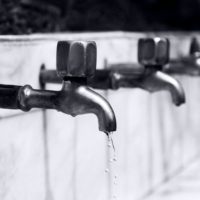Use an accredited laboratory.
Domestic well testing is the process of having an accredited laboratory test water from a private well for possible contaminants. The most common contaminants being arsenic, nitrate, and total coliform bacteria. You can also test for other contaminants. To determine what other contaminants you may be at risk for, call your local health department. Testing is required by law if selling a property with a private well. It is also recommended annually if using a well as a source of potable water.
Testing is required by law.
ORS 448.271 requires testing of domestic well water during a real estate transaction. The Oregon Real Estate Transaction law states:
“In any transaction for the sale or exchange of real estate that includes a well that supplies ground water for domestic purposes, the seller of the real estate shall, upon accepting an offer to purchase that real estate, have the well tested for arsenic, nitrates and total coliform bacteria. The Oregon Health Authority also may, by rule, require additional tests for specific contaminants in specific areas of public health concern. The seller shall submit the results of the tests required under this section to the authority and to the buyer within 90 days of receiving the results of the tests.”
The seller of the real estate, or property, is responsible for having the water tested. However, the seller can designate their attorney, real estate agent or broker, laboratory person conducting the water testing, or a private party to assist them in complying with water testing and reporting requirements. Notify the potential buyer of the results within 90 days and results should be sent to the state of Oregon’s Drinking Water Services.
The test results are valid for one year.
Samples must be collected according to the Oregon Administrative Rule OAR 333-061-0335 and analyzed by an accredited laboratory per OAR 333-061-0330.
It is recommended that you test for bacteria and nitrate every year. If these are present, it’s possible that disease causing organisms may be contaminating your water.
In addition, testing for the presence of arsenic should be done at least once. Some areas in Oregon are particularly susceptible and well owners are encouraged to routinely check their wells’ arsenic levels. If arsenic is present in an initial test (above 8ppb), you should retest. Upon the retest, if high concentrations continue, a treatment system should be installed. With a treatment system, testing should be done each year at point of use and every three years at the well head.
If you are just routinely testing your well, there is no obligation to report your results.
If you are selling your property, you must report specific information about the well and the quality of the water within 90 days from receiving the results. Results must be submitted to both the potential buyer and the state of Oregon (ORS 448.271).
Filing a Domestic Well Testing For Real Estate Transaction form.
The seller should complete a Domestic Well Testing For Real Estate Transaction form. Blank forms are also available from local real estate offices and Oregon Drinking Water Services. The completed Domestic Well Testing For Real Estate Transaction form and laboratory test results should be sent to:
Domestic Well Safety Program (DWSP)
800 NE Oregon Street, Suite 640
Portland, OR 97232
Contact Pumpro to schedule a water quality test and an estimate for filtration.
Domestic Well Testing For Real Estate Transaction form.
The Department conducts a variety of functions critical to the long-term management of Oregon’s groundwater resources. It is a priority to protect groundwater resources through construction, education, and enforcement procedures.
The Well Construction and Compliance Section is responsible for several program areas to ensure that wells are properly constructed, altered, maintained, and decommissioned. This is important to prevent contamination, loss of artesian pressure, and waste of groundwater resources. These program areas include the licensing of well constructors, enforcement of well construction standards,and recording groundwater use. As well as providing well ID labels to landowners during property transfers. Also, issuing special standards, and keeping a repository of well reports. The construction of wells and the data provided on well reports affects anyone using groundwater for domestic, municipal, industrial, environmental monitoring, or agricultural purposes.
